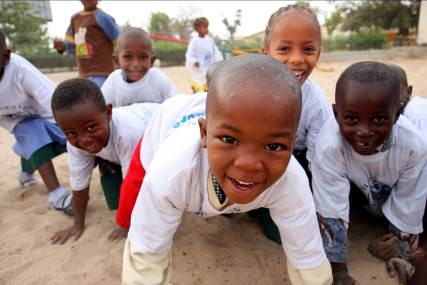One of the poorest regions of the country

The Upper River Region of Gambia is home to around 240,000 people. Most of them live in rural areas and Basse itself is a small town of around 18,000 people.
The Upper River Region is one of the poorest in the country. Life in rural areas is particularly hard – most families grow crops to feed themselves and make a living. However, the poor quality of the soil and the climate often make it hard for them to get enough food and make ends meet.
As many men have left the region, there is a high number of female-headed households. Women and girls are in need of special protection. Although early marriages and female genital mutilation are officially banned in The Gambia, they are still taking place. However, the situation for women and girls is slowly improving, as there has been a drop in the number of early marriages and pregnancies.
High number of boys and girls start school, however more girls than boys drop out of primary school. Overall, however, the literacy rates in the region are low – only around 50 per cent of the population can read and write. This is much lower than in other areas of the country where 62.9 per cent are literate.
Families need support so that they can stay together
Basse has seen some development in recent years and the social infrastructure has improved. However, many families continue to live precarious lives, which puts many children at risk of losing parental care.
In countries where poverty is as widespread as in The Gambia, the extended family plays an important role for the social security of many children. As traditional family structures deteriorate, more children are at risk of losing family care. Many children whose parents have fallen ill or even died live in households headed by grandparents or siblings. For these vulnerable children, food is often scarce and they are less likely to go to school. Without access to education, it is extremely difficult for the children to achieve secure living conditions as adults.
What we do in Basse
SOS Children’s Villages started supporting vulnerable children in Basse in 2007.
Strengthen families: Since 2010, SOS Children’s Village Basse also reaches out to vulnerable families in the area. We offer a variety of support, depending on the needs of the family. In some cases, this may be providing food or helping them with the cost of schooling. We ensure that they have access to adequate health care. Households led by women, children or grandparents are particularly vulnerable and therefore they account for most of the families we reach.
Care for children who cannot live with their families: Children with no one to care for them can find a loving home in one of the SOS families in Basse. Under the care and love of an SOS parent, the children grow up together with siblings in a family environment. Psychosocial support is important for the healthy development of children who have experienced traumas or neglect, and we carefully follow the development of all children in SOS families.
Support for young people: Due to the high level of youth unemployment in the region, it is often hard for young people to become independent. We guide and support them while they finish their education, their training and find their first job.
Education: We run a kindergarten and a primary school where children from the local community benefit from good learning environments together with children from SOS families. The SOS Kindergarten cares for up to 130 children, who can experience happy and fun moments of childhood as well as getting ready to start school. The SOS Hermann Gmeiner School in Basse provides high-quality basic education for more than 200 pupils.